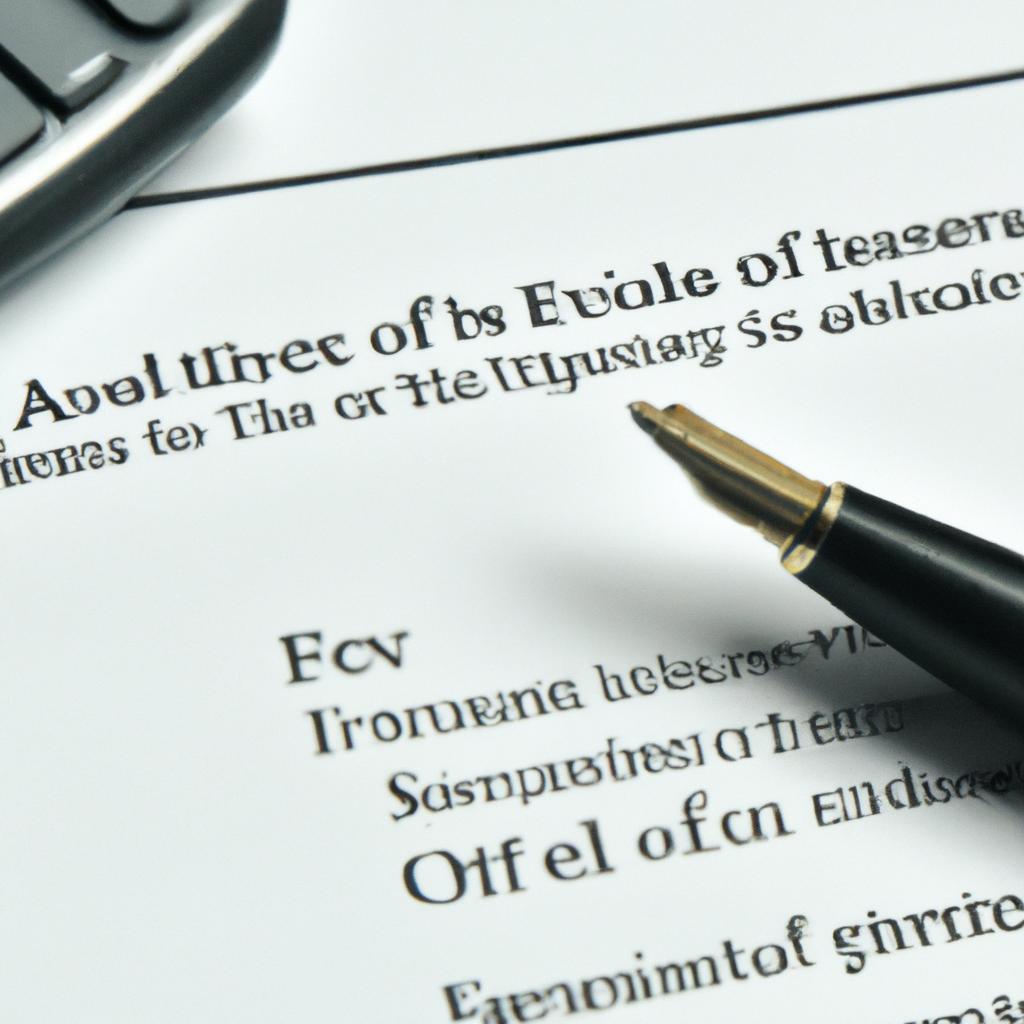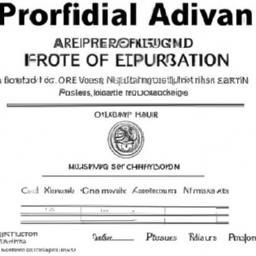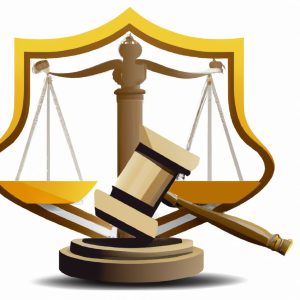In the realm of legal documentation, the self-proving affidavit form holds a unique significance in ensuring the validity and authenticity of a Last Will and Testament. As seasoned practitioners in the field of estate planning, probate, and elder law, the Morgan Legal Group recognizes the importance of this crucial document in safeguarding the wishes of individuals and families. Join us as we delve into the intricacies of the self-proving affidavit form and uncover its indispensable role in the realm of Wills and trusts.
Understanding the Purpose of a Self-Proving Affidavit Form
When it comes to estate planning, a self-proving affidavit form plays a crucial role in ensuring the validity of a will. This legal document allows witnesses to sign a sworn statement affirming that they witnessed the testator signing the will. By signing the affidavit, the witnesses are essentially testifying to the authenticity of the will, making it easier for the court to accept the document as valid. The self-proving affidavit form eliminates the need for witnesses to appear in court during probate, thus streamlining the process and reducing the risk of will contests.
A self-proving affidavit form is a simple yet powerful tool that can help prevent disputes and challenges to a will after the testator has passed away. By having witnesses sign a sworn statement at the time of signing the will, the testator can provide clear and convincing evidence of their wishes. This can give the testator and their loved ones peace of mind, knowing that their final wishes will be carried out as intended. In the complex world of estate planning, a self-proving affidavit form is a valuable asset that can help protect the testator’s legacy for future generations.

Key Elements to Include in a Self-Proving Affidavit Form
When creating a self-proving affidavit form, it is crucial to include key elements that will ensure its validity and effectiveness in the event of a dispute. One important element to include is the identification of the testator, including their full name, date of birth, and address. This information will help establish the identity of the individual making the affidavit and will help prevent any confusion or challenges to the document.
Another essential element to include in a self-proving affidavit form is a statement affirming that the testator signed the will in the presence of witnesses and that they did so willingly and with full knowledge of the contents of the document. This statement should be signed by both the testator and the witnesses, and should include a declaration that the testator was of sound mind and not under any undue influence at the time of signing. Including these key elements in a self-proving affidavit form will help strengthen the validity of the document and protect the wishes of the testator.
| Full Name | Date of Birth |
| John Doe | 01/01/1970 |
| Jane Smith | 03/15/1984 |

Benefits of Utilizing a Self-Proving Affidavit Form in Estate Planning
Utilizing a self-proving affidavit form in estate planning can offer numerous benefits for individuals seeking to streamline the probate process and ensure their final wishes are carried out smoothly. One of the key advantages of incorporating a self-proving affidavit in your estate planning documents is the ability to speed up the probate process by eliminating the need for witnesses to testify in court regarding the validity of the will. This not only saves time and money but also provides added peace of mind knowing that your wishes will be efficiently executed without unnecessary delays.
Additionally, a self-proving affidavit can help prevent potential challenges to the validity of your will after your passing. By having witnesses sign a notarized affidavit affirming that they observed you signing the will, the likelihood of disputes arising over its authenticity is significantly reduced. This added layer of protection can help safeguard your final wishes and ensure that your estate is distributed according to your intentions without the risk of lengthy legal battles among beneficiaries. With the assistance of experienced estate planning professionals like Morgan Legal Group, incorporating a self-proving affidavit form into your estate planning documents can provide invaluable peace of mind and protection for you and your loved ones.
Recommendations for Completing a Self-Proving Affidavit Form
In order to successfully complete a self-proving affidavit form, there are a few key recommendations to keep in mind. Firstly, be sure to carefully review the form and fill it out accurately with all necessary information. This includes providing the names and addresses of the witnesses who will sign the affidavit, as well as the names of the individuals making the affidavit.
Secondly, it is essential to ensure that the witnesses follow the proper procedure when signing the affidavit. They should sign the form in the presence of a notary public, who will then notarize the document. This step is crucial in validating the authenticity of the affidavit and can help prevent any challenges to the validity of the Will in the future. By following these recommendations, you can effectively complete a self-proving affidavit form and help ensure that your wishes are carried out as intended.
Q&A
Q: What is a self proving affidavit form?
A: A self proving affidavit form is a legal document that is used to validate the authenticity of a will without the need for witnesses to testify in court.
Q: Why is a self proving affidavit form important?
A: This form is important because it can streamline the probate process by eliminating the need for witnesses to come forward and verify the validity of a will, saving time and money for all parties involved.
Q: What information is typically included in a self proving affidavit form?
A: A self proving affidavit form typically includes the names of the testator (the person who created the will) and the witnesses, as well as a statement affirming that the will was signed voluntarily and in the presence of the witnesses.
Q: How is a self proving affidavit form different from a traditional affidavit?
A: A self proving affidavit form differs from a traditional affidavit in that it is specifically designed to verify the validity of a will, whereas a traditional affidavit can be used to attest to a wide range of facts or events.
Q: Can a self proving affidavit form be contested in court?
A: While it is rare for a self proving affidavit form to be contested in court, it is still possible for interested parties to challenge its validity if they believe that there was fraud or undue influence involved in the signing of the will.
Insights and Conclusions
In conclusion, using a self proving affidavit form can provide peace of mind and ensure that your final wishes are carried out exactly as you intended. By taking the time to complete this form and have it notarized, you are creating a legally binding document that can simplify the probate process for your loved ones. Whether you are creating a will for the first time or updating an existing one, a self proving affidavit form is a valuable tool to consider. Take the necessary steps now to protect your legacy and provide clarity for your heirs.
 Self Proving Affidavit Form: Everything You Need to Know
Self Proving Affidavit Form: Everything You Need to Know
Have you ever heard of a self proving affidavit form? If you haven’t, you’re not alone. This legal document is not commonly known, but it can play an important role in various legal and financial matters. In this article, we’ll explain what a self proving affidavit form is, its purpose, how to create one, and its benefits. So, if you want to stay informed and empowered, keep reading.
What is a Self Proving Affidavit Form?
A self proving affidavit form is a legal document that is typically used to confirm the validity of a will. It serves as evidence that the will was executed properly and that the testator (the person creating the will) was of sound mind and not under duress when they created it. It essentially acts as a sworn statement that the will is the true and legal last testament of the deceased.
But a self proving affidavit form can also be used in other legal situations where a sworn statement or oath is required, such as in a court case or when transferring property ownership. Essentially, it is a way to add credibility and validity to important legal documents.
How to Create a Self Proving Affidavit Form
Creating a self proving affidavit form is a relatively straightforward process, but it is important to follow the correct steps to ensure its validity. Here are the steps to create your own self proving affidavit form:
1. Include the basic information: The self proving affidavit form should include the full legal names of the testator, witnesses, and the executor/administrator of the will. It should also state the location and date of the signing and include the legal description of the testator’s property.
2. Get signatures: The testator and two witnesses should sign the self proving affidavit form in the presence of a notary or a lawyer.
3. Include the oath: The self proving affidavit form must include an oath or statement that declares the legitimacy of the will and that it was executed properly. It should also include a declaration of sound mind and freedom from duress. The language used should be clear and unambiguous.
4. Ensure proper formatting: The self proving affidavit form should be properly formatted with clearly labeled sections for the testator’s information, witnesses’ information, and the oath. It should also include space for signatures and the notary’s stamp.
5. Add any other required elements: Depending on your state or country, there may be other required elements to include in the self proving affidavit form. Be sure to research the legal requirements in your jurisdiction to ensure the validity of the document.
Benefits of a Self Proving Affidavit Form
1. Saves time and hassle: By including a self proving affidavit form with a will or other legal document, you can avoid the need for witnesses to appear in court to testify to the document’s validity. This can save time, effort, and potential conflicts.
2. Provides evidence of competency: Including a self proving affidavit form can prevent any challenges to the creator’s mental competency, which can arise when trying to prove the authenticity of a will in court.
3. Avoids unnecessary legal expenses: Without a self proving affidavit form, the execution of a will can become a lengthy and costly legal process. By providing a sworn statement of authenticity, a self proving affidavit form can streamline the process and potentially save the estate from unnecessary legal expenses.
4. Ensures the testator’s wishes are honored: By including a self proving affidavit form, the testator’s wishes are more likely to be upheld and honored by the court. This is especially important in situations where family members may contest the validity of a will.
Takeaways
A self proving affidavit form can be a valuable document to include in legal matters involving wills, court cases, or property transfers. This legal document serves as a sworn statement that verifies the authenticity and validity of the accompanying document, providing evidence of competency and preventing potential legal challenges. By following the proper steps to create a self proving affidavit form, you can save time, avoid unnecessary expenses, and ensure that your wishes are respected and honored. Remember to research the legal requirements in your jurisdiction to ensure the validity of the form.
So, the next time you’re involved in a legal matter, consider the benefits of including a self proving affidavit form to save time, effort, and potential conflicts. With this knowledge, you can confidently handle legal matters and stay informed and empowered.












